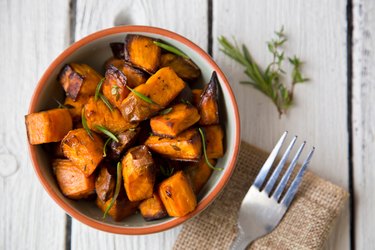
Although they're mostly known as the orange-fleshed vegetables that accompany marshmallows at Thanksgiving, sweet potatoes come in many varieties and colors. There is no one healthiest way to cook sweet potatoes, as different cooking methods affect the bioavailability of nutrients in each variety.
Sweet Potato Nutrition
Video of the Day
Sweet potatoes — edible roots within the morning glory family — are rich in potassium, fiber and vitamins C and B6, according to the Harvard T.H. Chan School of Public Health. They are also one of the top sources of beta-carotene, a precursor to vitamin A, in the plant world. According to the USDA, one plain small baked sweet potato with the skin eaten contains:
Video of the Day
- 68.5 calories
- 1.5 grams of protein
- 2.5 grams of fiber
- 0 grams of cholesterol
- 0.1 grams of fat
- 8,790 micrograms of beta-carotene
- 363 milligrams of potassium (10.4 percent of the daily value or DV)
- 41.6 grams of phosphorous (4.2 percent of DV)
- 14.9 milligrams of vitamin C (24.8 percent of DV)
- 1.8 micrograms of vitamin K (2.2 percent of DV)
- 4.6 micrograms of folate (1.1 percent of DV)
- 0.2 milligrams of vitamin B6 (11 percent of DV)
Apart from vitamins and minerals, sweet potatoes are also rich in anthocyanins. These water-soluble flavonoids have many health benefits, including anti-oxidation and anti-tumor capacities and helping to prevent and treat cardiovascular disease, according to a September 2015 study published in Food Science and Human Wellness. Anthocyanins are more prevalent in purple than in yellow or orange sweet potatoes.
Read more: Are Baked Potatoes Healthy?
Boiling Sweet Potatoes
In the September 2015 Food Science and Human Wellness study_,_ researchers compared the effects of different cooking methods on the bioavailability of various bioactive compounds in five varieties of sweet potatoes. The researchers note that it is difficult to digest and absorb nutrients in raw sweet potatoes due to the starch. That said, there is also no cooking method that retains and protects all of the chemical compositions, nutrients and antioxidant capacities of sweet potatoes.
The study did find that boiling sweet potatoes retains more beta-carotene and makes it more absorbable than other cooking methods, such as frying, baking or steaming. Though this is the case, roasting sweet potatoes retained more anthocyanins than the other cooking methods. Lastly, steaming sweet potatoes preserved greater amounts of other phenolic compounds in sweet potatoes than the other cooking methods.
Read more: Is It Healthier to Eat Potatoes Raw?
Sweet Potato Recipes
If you want to ensure you get all of the nutritional benefits of sweet potatoes, cook and eat them many different ways. You can find a plethora of delicious sweet potato recipes on the internet. You can try making baked sweet potato fries in the oven, cut sweet potatoes into small cubes and roast them with olive oil and sea salt, steam and mash them or bake them whole and add toppings such as chives and onions.
Try this delicious LIVESTRONG.com recipe for Smoky Maple Sweet Potatoes, which takes about 15 minutes to make and only requires five ingredients: sweet potatoes, sea salt, maple syrup, smoked paprika and water. The recipe calls for boiling the sweet potatoes in a pot with water, maple syrup and paprika for a sweet and smoky flavor.
You can also add sweet potatoes to your breakfast by trying our mouth-watering "Twice Baked Sweet Potato and Egg Recipe." Whichever way you prepare them, you're sure to enjoy this nutritious food.
Read more: Sweet Potatoes and Weight Loss
- Harvard T.H. Chan School of Public Health: "Sweet Potatoes"
- Food Science and Human Wellness: "Profiles of Phenolics, Carotenoids and Antioxidative Capacities of Thermal Processed White, Yellow, Orange and Purple Sweet Potatoes Grown in Guilin, China"
- USDA FoodData Central: "Sweet Potato, Baked, Peel Eaten, Fat Not Added in Cooking"
- Food and Drug Administration: "Vitamin and Mineral Chart"